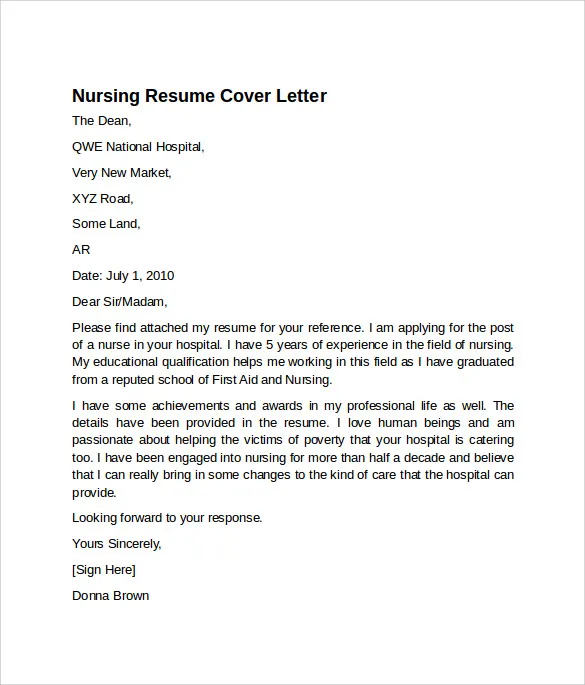Why You Need a Nursing Cover Letter
A nursing cover letter is more than just a formality; it’s your chance to make a strong first impression and demonstrate your suitability for a nursing position. In a competitive job market, a well-crafted cover letter can set you apart from other applicants. It allows you to showcase your personality, highlight your relevant skills and experiences, and express your genuine interest in the specific role and the healthcare organization. A cover letter provides context to your resume, explaining why your qualifications align perfectly with the job requirements and the employer’s needs. It is an opportunity to explain any gaps in employment, career changes or why you are passionate about nursing.
Highlighting Your Nursing Skills and Experience
Your nursing cover letter is the perfect place to showcase the skills and experience that make you a strong candidate. Begin by identifying the key skills mentioned in the job description and tailor your letter to address them. Highlight your clinical skills, such as patient assessment, medication administration, and wound care. Discuss your experience with specific patient populations, such as geriatric, pediatric, or critical care. Quantify your accomplishments whenever possible; for example, mention the number of patients you’ve cared for or the positive outcomes you’ve achieved. Be specific about the technologies and electronic health records (EHR) systems you’re proficient with, such as Epic, Cerner, or Meditech, which will make you even more attractive for a nursing position.
Key Skills to Include in Your Cover Letter
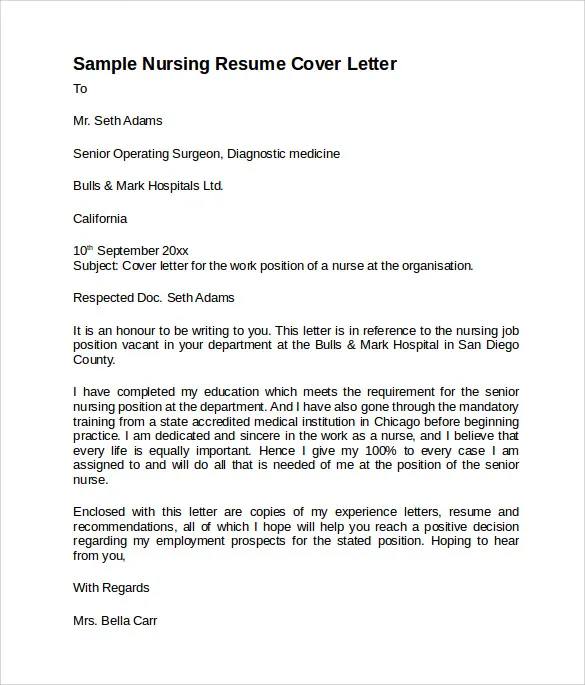
When writing your nursing cover letter, make sure to include both hard and soft skills. Hard skills are technical abilities like patient assessment, medication administration, and electronic health record (EHR) proficiency. Soft skills are interpersonal attributes, such as communication, empathy, and critical thinking. Make sure to show how you have used these skills to help patients. Be sure to include: active listening, critical thinking, time management, stress management, communication, collaboration, and empathy.
Detailing Your Nursing Experience
In the body of your cover letter, provide a brief overview of your work history and include details about your role and what you achieved. Mention specific healthcare settings in which you’ve worked, such as hospitals, clinics, or long-term care facilities. Briefly mention responsibilities such as direct patient care, medication administration, and collaboration with interdisciplinary teams. Quantify your achievements with numbers and data, such as patient satisfaction scores. Show your experience in different clinical settings and if you have any special training or certifications.
Tailoring Your Cover Letter to the Job
One of the most critical aspects of a successful nursing cover letter is tailoring it to the specific job and healthcare organization. Generic cover letters are easily identified and often discarded. Carefully review the job description and identify the key requirements, skills, and qualifications the employer is seeking. Highlight your skills and experiences that directly align with those requirements. Use the same keywords and phrases that the employer uses in the job posting. Mention why you are excited about this particular opportunity, organization, or department. Make sure to show that you’ve researched the company and understand their values and mission.
Researching the Employer and Role
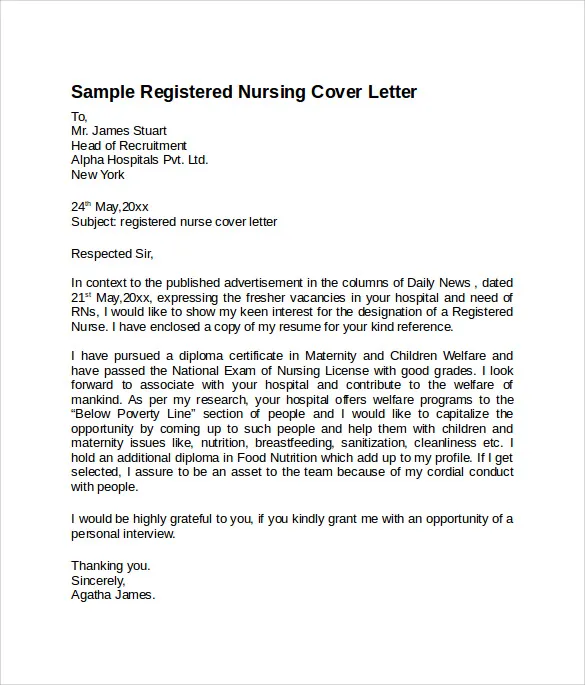
Before writing your nursing cover letter, it’s important to thoroughly research the healthcare organization and the specific role you are applying for. Visit the organization’s website to learn about its mission, values, and patient care philosophy. Explore their social media profiles and news articles to understand their recent activities, achievements, and community involvement. Understand the specific requirements, responsibilities, and expectations of the nursing position you are interested in. This research will help you tailor your cover letter to demonstrate your genuine interest and suitability for the role.
Formatting Your Nursing Cover Letter for Impact
The format of your nursing cover letter is just as important as its content. A well-formatted letter is easy to read and makes a positive impression. Use a professional font, such as Times New Roman, Arial, or Calibri, in a readable size (11-12 points). Maintain consistent formatting throughout the letter, including margins, spacing, and bullet points. Keep the letter concise, ideally no more than one page. Use clear, concise language and avoid jargon or overly technical terms. Break up large blocks of text with bullet points, headings, and white space to improve readability. Consider the layout and overall design of your cover letter to make it visually appealing and professional.
Essential Elements of a Nursing Cover Letter
A comprehensive nursing cover letter includes several essential elements. Your nursing cover letter should have a professional header, a body with an introduction, several paragraphs, and a strong conclusion, which emphasizes your interest. Proofread your letter for any grammatical errors.
Contact Information
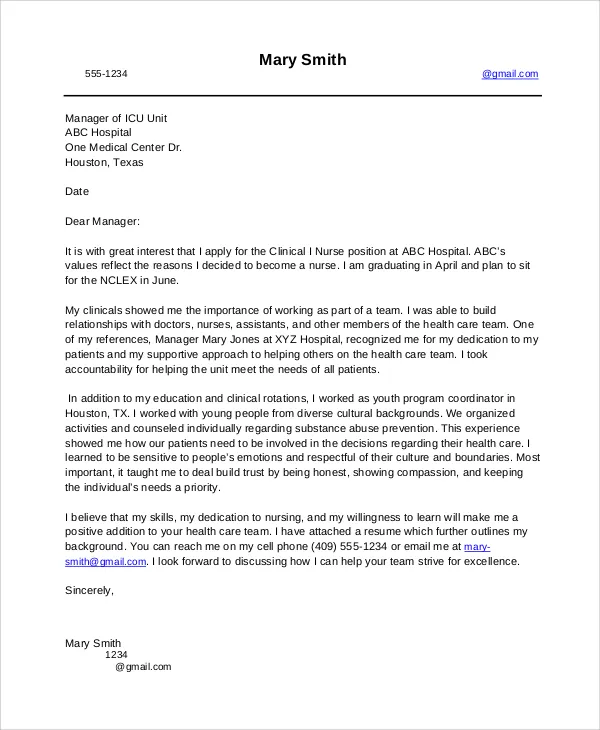
At the top of your nursing cover letter, include your full name, phone number, email address, and professional social media profiles like LinkedIn. This information should be clearly visible and easy for the hiring manager to find. Ensure that your email address is professional and appropriate for job applications.
Professional Header
Include a formal heading that includes the date, the hiring manager’s name, and the healthcare organization’s name and address. If you don’t know the hiring manager’s name, you can use a generic salutation like “Dear Hiring Manager.”
The Body of Your Nursing Cover Letter
The body of your nursing cover letter is where you showcase your skills, experiences, and interest in the position. Structure the body into three or four well-defined paragraphs to make your letter easy to read and follow.
First Paragraph: Grab Attention
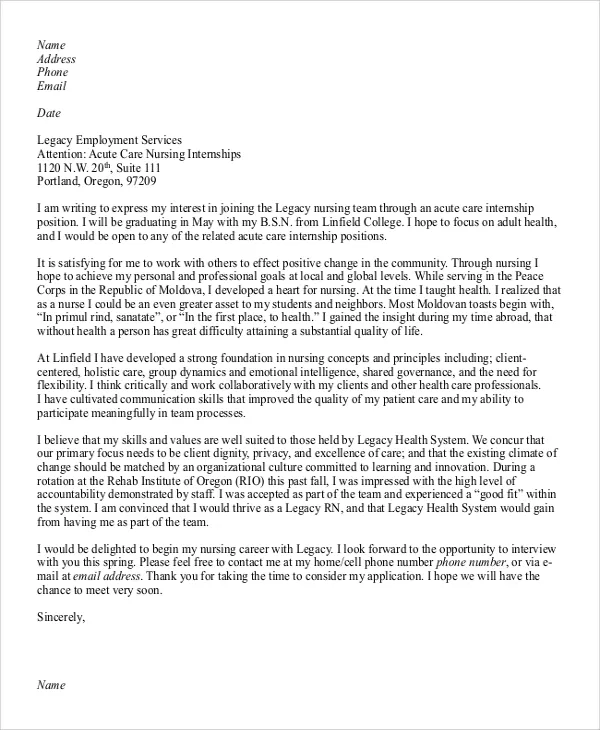
Start your cover letter with an engaging introduction that grabs the reader’s attention. State the position you’re applying for and where you found the job posting. Briefly mention your key qualifications or a compelling achievement that aligns with the job requirements. Express your enthusiasm for the opportunity and the healthcare organization.
Second Paragraph Highlight Achievements
In the second paragraph, delve deeper into your skills and experiences. Highlight your most relevant qualifications and how they align with the job requirements. Provide specific examples of your achievements. Quantify your accomplishments whenever possible (e.g., “Reduced patient fall rates by 15%”). Demonstrate your knowledge of nursing and how you will contribute to the organization.
Third Paragraph Express Interest
In the third paragraph, express your genuine interest in the specific role and the healthcare organization. Explain why you are excited about the opportunity and what attracts you to the organization’s mission, values, or culture. Demonstrate your research of the organization and your understanding of its goals. Show how your career aspirations align with the goals of the company.
The Closing Paragraph
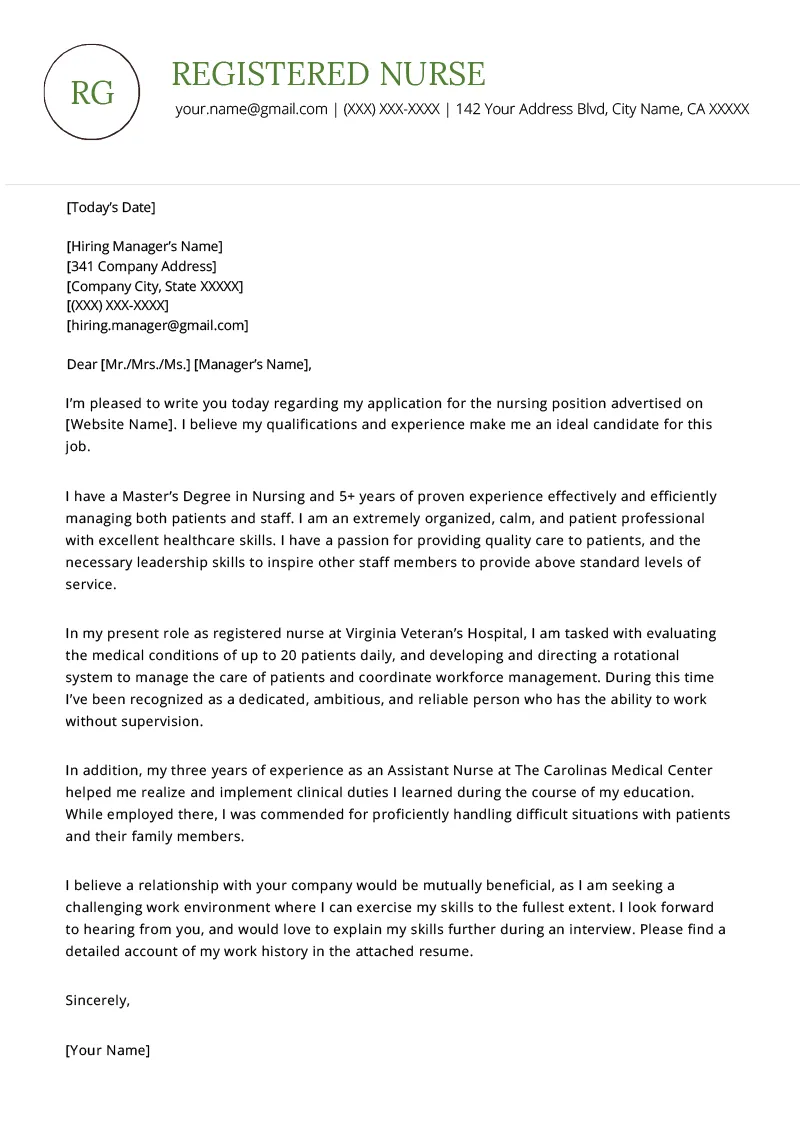
Conclude your nursing cover letter with a strong closing paragraph that reiterates your interest and enthusiasm. Thank the hiring manager for their time and consideration. Include a call to action, such as “I look forward to the opportunity to discuss my qualifications in an interview” or “Thank you for your time; I look forward to hearing from you soon.” Reiterate your contact information and make yourself available for an interview.
Proofreading and Editing Your Cover Letter
Proofreading and editing your nursing cover letter is crucial to ensure it’s free of errors. Typos, grammatical mistakes, and formatting inconsistencies can create a negative impression and undermine your credibility. Carefully review your cover letter for any errors in spelling, grammar, punctuation, and sentence structure. Read the letter aloud to catch any awkward phrasing or unclear sentences. Ask a friend, family member, or career counselor to review your letter for feedback and to catch any errors you may have missed. Ensure that all contact information is correct.
Common Mistakes to Avoid in Your Cover Letter
Several common mistakes can damage the effectiveness of your nursing cover letter. Be aware of these pitfalls and avoid making them when crafting your letter.
Formatting and Presentation Errors
Incorrect formatting, such as using an unprofessional font, inconsistent spacing, or poor margins, can make your cover letter difficult to read and create a negative impression. Ensure your letter is well-formatted, easy to read, and visually appealing.
Lack of Specificity
A generic cover letter that lacks specific examples and quantifiable achievements can be easily dismissed. Tailor your cover letter to the job description and highlight your relevant skills and experiences. Provide specific examples of your accomplishments and quantify your results whenever possible. Show the hiring manager how your skills and experiences align with the job requirements.
Ignoring the Job Description
Failing to address the specific requirements and qualifications outlined in the job description is a major mistake. Carefully review the job posting and identify the key skills and experiences the employer is seeking. Tailor your cover letter to address these requirements. Use the same keywords and phrases from the job description to show the hiring manager that you have the qualifications they are looking for.
Submitting Your Nursing Cover Letter
Once your nursing cover letter is complete, it’s time to submit it. Follow the application instructions carefully and submit the cover letter and resume together. Ensure that the documents are in the requested format and that your contact information is up-to-date. It’s also important to send a follow-up email.
Sending Your Letter as a PDF
When submitting your nursing cover letter, it’s generally best to send it as a PDF file. PDF files preserve the formatting of your document, ensuring that it appears exactly as you intended, regardless of the recipient’s operating system or software. This is especially important when your letter includes specific formatting, such as bullet points or tables. Before sending the cover letter as a PDF, always double-check that it’s properly formatted.
Follow-Up After Submission
After submitting your nursing cover letter, it’s appropriate to follow up with the hiring manager to express your continued interest in the position. Send a brief, professional email or make a phone call, typically one to two weeks after submitting your application. In your follow-up, reiterate your interest, thank the hiring manager for their time, and inquire about the status of your application. Be polite and professional, and avoid being overly aggressive or pushy. A well-timed follow-up can show your enthusiasm and increase your chances of being considered for an interview.
